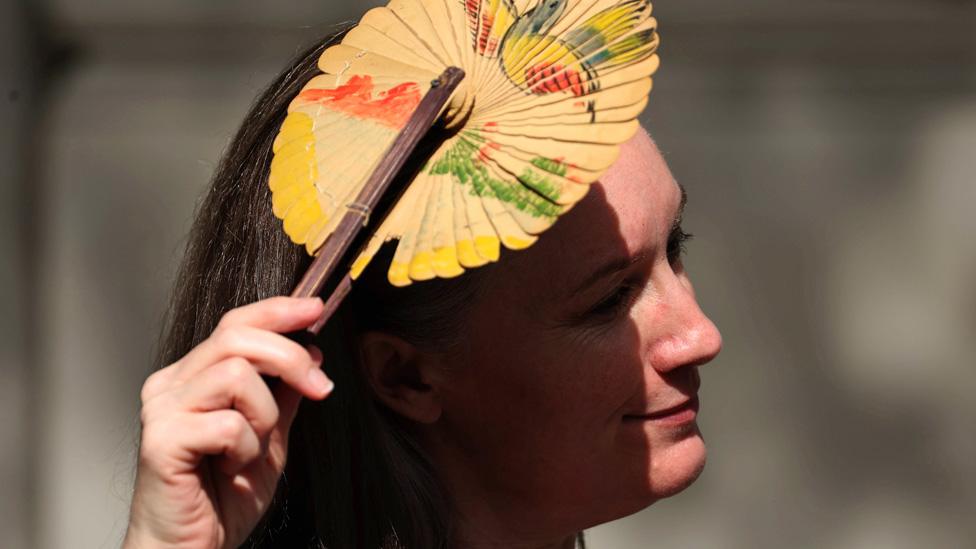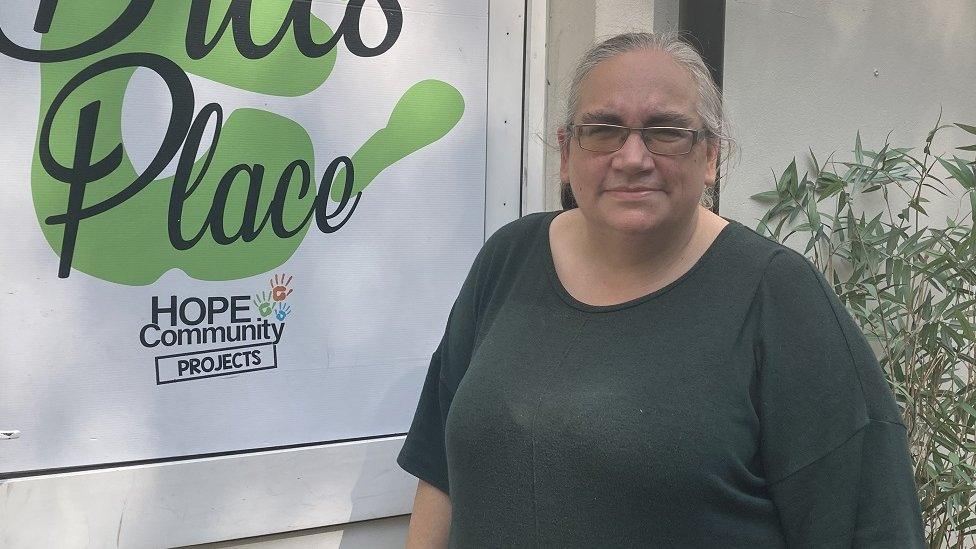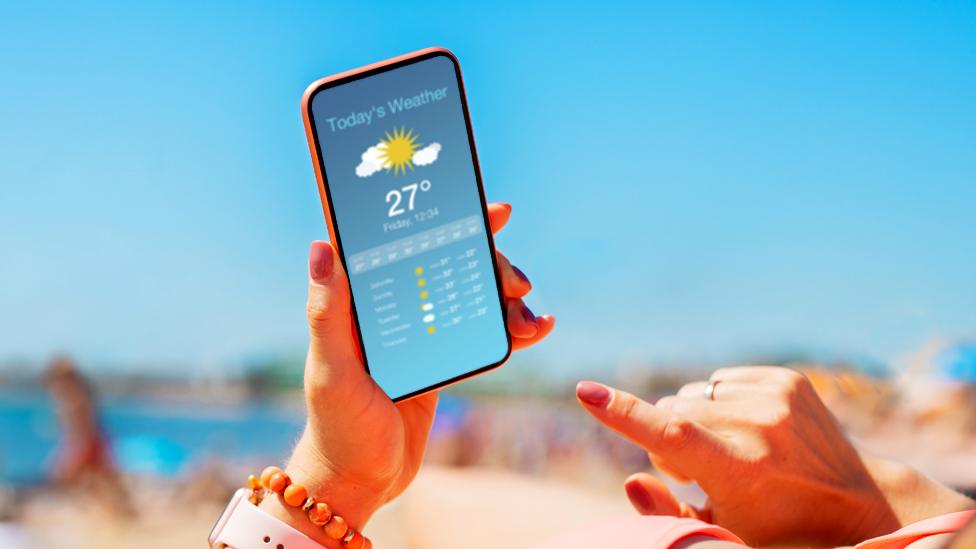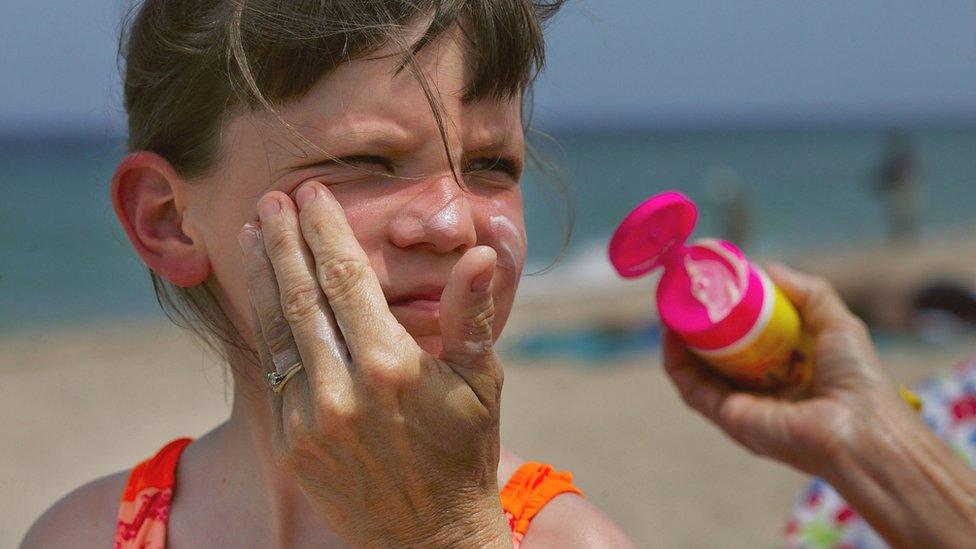UK Heatwave: Tackling myths around darker skin and SPF
- Published

It took a lot of research for Demi to realise that her skin needed sun cream to be protected
If you're planning to spend some time in the sun, you'll be packing the essentials: sunglasses, hat, water bottle and… suncream?
It can help protect you against the harmful rays of the sun and can reduce the risk of developing skin cancer.
But not everyone thinks applying it is necessary, and that can be particularly true in some minority communities.
Past global studies have found, external people from certain groups are less likely, external to use recommended protection.
With heat warnings in place and parts of the UK expected to reach 32C (89.6F) this week, BBC Newsbeat looks at some of the myths behind this reluctance.
Natural protection?
Demi Colleen, 29, is a content creator who focuses on beauty and addressing misunderstandings around sunscreen for minority communities.
She "believed the myths about the UK sun not being strong enough to cause any damage" when she was younger.
"Because I'm brown, I thought that I didn't need to apply SPF [Sun Protection Factor] to my skin," she says.
Demi feels phrases like "black don't crack" - which refers to the belief black people tend not to show the effects of ageing - wrongly suggests there is enough natural protection against the sun.
She admits that meant she was "lax with SPF" as a teenager.

It was after seeing a dermatologist that Tanvi "started taking skincare more seriously and realised the importance of SPF"
Tanvi Shah agrees with Demi, saying when she was younger she wouldn't wear suncream on her face.
The 27-year-old influencer feels it was due to "the lack of education and knowledge around the importance of SPF".
"When you're south Asian - I'm Indian - there is this false assumption that because we don't get sunburnt [as often], we don't need SPF on our face."
So how much natural protection do you actually have?
Dr Vanita Rattan is a skin expert and says people of colour have melanin in the skin, which does offer some natural protection.
But, she adds, it's the same as an SPF rating of around seven, protection that is "so low you wouldn't even put it in a bottle".
DIY remedies
Tanvi says Indian households - particularly older generations - might be less trusting of over-the-counter products.
She remembers being recommended a turmeric mask for her "problematic skin", but didn't feel it helped.
And she thinks a lack of knowledge about what is "scientifically proven" to work can be passed on to younger family members.
This was something Demi experienced in terms of sun protection, using carrot oil to encourage her skin to tan deeper.
After visiting a dermatologist and researching routines and products, Demi changed her mind.
"I realised that all the myths I believed, the misconceptions about SPF, its purpose and the way it worked were just untrue," she says.

Staying safe in the sun
Wear protective clothing
Use SPF 30+ sunscreen with at least four-star UVA protection
Wear a wide-brimmed hat
Wear quality sunglasses
Seek shade from the sun whenever possible
Are you applying sun cream properly?

Demi also feels marketing has played a part, and adverts have historically been "very much targeted towards white people".
And the products themselves haven't given enough thought to the effect on diverse skin tones, she says.
People have told Demi traditional products left them looking, external "ghostly with a white cast".
"Sunscreen has always been considered as a sort of white people thing," says Demi.
"Black and brown people are being left out of the conversation. So a lot of work needs to be done."
Dr Rattan says products have developed in the past five years, and now brands catering to different skin tones are available.
"Previously, we just didn't have very good skincare, you may be lucky to get a good moisturiser," she says.

Dr Rattan feels there is a greater selection of products available to buy
Price has also been raised as a possible barrier.
The government in the Netherlands wanted to tackle record rates of skin cancer, so installed free suncream dispensers in schools and universities and at festivals, parks, sports venues and open public spaces across the country.
In the UK, sunscreen is classified as a "cosmetic" product and carries a 20% tax, adding around £1.50 to the cost of a bottle.
Charities in the UK have called for this to be scrapped.
Tanvi and Demi agree that greater accessibility would encourage more people in the UK to use it.
"It's essentially medical usage," says Demi.
"It's not just for vanity or for beauty, this is protecting you for a medical reason," says Demi.
The Department of Health says support is available for some people.
"High-factor sunscreen is on the NHS prescription list for certain conditions and is already provided VAT free when dispensed by a pharmacist to these patients."


Follow Newsbeat on Twitter, external and YouTube, external.
Listen to Newsbeat live at 12:45 and 17:45 weekdays - or listen back here.
Related topics
- Published6 September 2023

- Published26 June 2023

- Published15 June 2023

- Published16 July 2022


